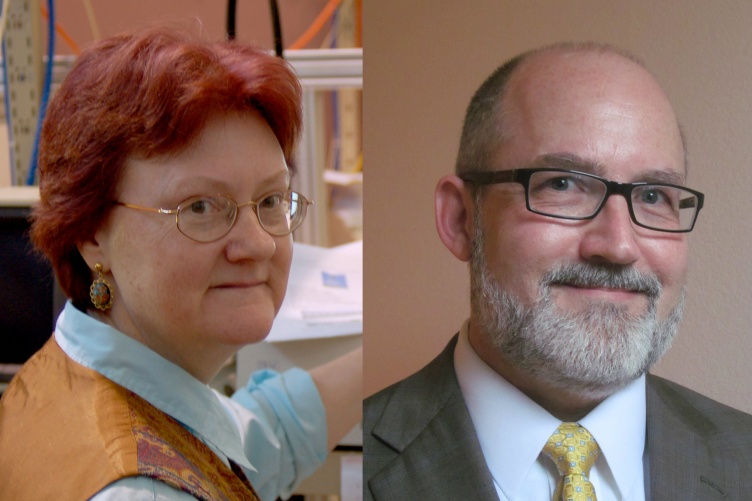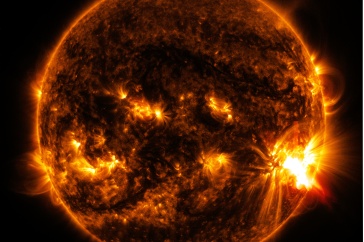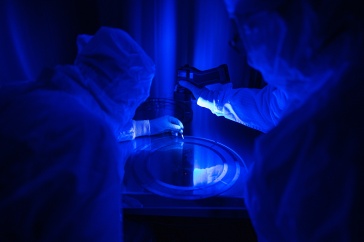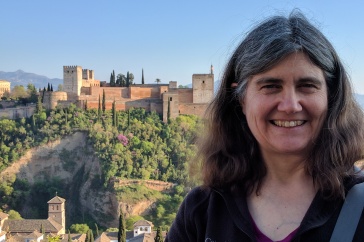
Two UNH space scientists have been named Fellows of the American Geophysical Union (AGU), a prestigious award that honors exceptional scientific contributions to Earth and space sciences.
Joseph Dwyer, professor of physics, and Antoinette ‘Toni’ Galvin, research professor in physics and astronomy, are among the 62 international scientists who are being recognized for work that has significantly advanced research in their fields. Each year, fewer than 0.1 percent of AGU members are bestowed this lifelong fellowship. Galvin is the first research scientist from UNH ever appointed, and she and Dwyer join Lynn Kistler, director for the UNH Space Science Center, as the only three current university employees who are AGU Fellows.
“Toni Galvin and Joe Dwyer are both so richly deserving of this distinct honor,” says Harlan Spence, director for the UNH Institute for the Study of Earth, Oceans, and Space (EOS). “It is rare enough for even one member of EOS to become an AGU Fellow in any single year; how remarkable to have two! Both Toni and Joe have amassed amazing records of contributions to space physics, measured by the instruments they have developed, the missions they have served on, the next generations of scientists they have mentored, let alone the amazing scientific discoveries they have made themselves and enabled for others. I am delighted that the AGU has recognized their many accomplishments, placing them in the very highest echelons of the international space physics discipline."
Dwyer is a physicist who has spent the last 18 years doing research to better understand thunderstorms and lightning, including how lightning initiates and propagates and how thunderstorms emit powerful burst of gamma rays called terrestrial gamma-ray flashes. He has made important observational and theoretical contributions to the study of X-ray emissions from lightning and the gamma-ray emissions from thunderstorms. He has also played a key role in establishing the new field of high-energy atmospheric physics. Dwyer has served as the president of Atmospheric and Space Electricity Section within AGU, and he is currently the Peter T. Paul Chair in the Space Sciences at UNH.
Galvin is a heliophysicist who develops instruments to study solar wind, plasma, the sun and interplanetary space. She has assisted in the development of more than 20 space instruments for 10 NASA missions throughout her career, including being a principal investigator on the NASA STEREO mission. She has been integral in helping with instrument design, testing, data analysis, flight operations and instrument integration with spacecraft. Galvin is committed to public outreach and workforce development as well, having served as the director for New Hampshire Space Grant Consortium and New Hampshire NASA EPSCoR since 2011.
Both Dwyer and Galvin note that their research has benefitted from their colleagues’ support and collaboration throughout their careers.
“I am really grateful for all the help and encouragement that I received from my family, friends and colleagues over the years,” says Dwyer. “I also appreciate the strong support that I have received from UNH, and I feel lucky to have worked with such a great bunch of students whose hard work made this research possible.”
“It’s a team effort to get where we’re at,” Galvin says. “I’m not a theorist, but rather, I’m an experimentalist, which means my work relies on so many other people — engineers, technical staff, computer programmers and many others — to help get our instruments out there. I feel humbled that my peers nominated me, and it’s a big honor to be recognized with this award.”
EOS is UNH’s largest research enterprise, comprising six centers with a focus on interdisciplinary, high-impact research on Earth and climate systems, space science, the marine environment, seafloor mapping and environmental acoustics. With more than $43 million in external funding secured annually, EOS fosters an intellectual and scientific environment that advances visionary scholarship and leadership in world-class research and graduate education.
-
Written By:
Rebecca Irelan | Institute for the Study of Earth, Oceans, and Space | rebecca.irelan@unh.edu | 603-862-0990
















































